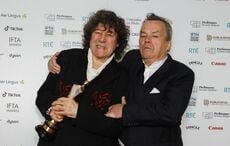Today, May 12, marks the day that George Denis Patrick Carlin was born in New York, New York, in 1937. The son of Patrick John Carlin, an Irish emigrant from Donegal, and Mary Beary, the daughter of an Irish immigrant cop, George Carlin would go on to be one of the greatest comedians and social commentators of all time.
IrishCentral's sister publication Irish America magazine featured an intimate interview with Carlin in their June/July 2006 issue - one of the last interviews he did before his death on June 22, 2008. Conducted by T.J. English, the interview was a real meeting of minds, and we're happy to share some excerpts here, along with clips of Carlin's shows. Read the full interview here.
Carlin was raised on West 121st Street in a part of Upper Manhattan commonly known as "white Harlem." Left to his own devices (Carlin's parents split when he was two months old), young George learned about life - and developed his sense of humor - mostly in the streets, in a neighborhood populated by a lively mix of Irish-Americans, Puerto Ricans and blacks.
After battling a domineering mother, the priests at Cardinal Hayes High School in the Bronx, and later his commanding officers in the U.S. Air Force, Carlin launched his career in show business as a radio disc jockey. Once he established himself as a solo stand-up comic in the early 1960s, his career took off.
Read More: Rebels like George Carlin taught us how to laugh

George Carlin in 1969
Irish America caught up with the comic during a concert date in Chicago, on the eve of St. Patrick's Day. Though he had only two months earlier spent time in the hospital for a heart condition (in his lifetime Carlin has had three heart attacks and five angioplasties) he was in a chipper mood. His memory was sharp, his mind lively, and his vocabulary as profane as ever. The interview with TJ English began with a question about his Irish background.
CARLIN: Well, first of all, I never knew my father. My mother left him when I was two months old. From what I've been told, he was a bully. He drank fiercely, and his personality changed. A street angel and a house devil, my mother called him. He never hit my mother because she had four brothers, and her father was a policeman. And bullies are usually cowards. But he menaced her, and she was from a peaceful family. The Beareys, my mother's family, were very tranquil. So she was afraid of him.
The way I heard it, my father used to drink at a place on upper Broadway on his way home from work. And he'd get juiced. He'd come home and he'd be his usual f**ked-up self. Now, my mother was a woman from humble beginnings with lace-curtain Irish pretensions. She insisted on having nice things - fine crystal, fine silver, mahogany furniture, good linens. She was obsessed with that shit. She didn't like the shanty Irish. In later years she talked about my father that way. I got his gift of gab. And my mother's. She was very verbal, very funny, and she had a quick mind. She was the one who loved the dictionary. If I ever asked her about a word, she'd say, "Let's go look it up." And she talked to me about all the great Irish writers, about their gifts with the language. She would tell me about Oscar Wilde and George Bernard Shaw and Yeats and Beckett.
ENGLISH: But no Joyce?
CARLIN: She mentioned Joyce. I don't think she was into his work so much, but she liked the fact that he was revered and he was Irish. And then O'Neill. She saw all the Eugene O'Neill plays, which I think are now dated and a little overwrought but nonetheless full of good Irish drama and rip-roaring fun.
So there was a strong sense of Irish pride around the house. I was watching the St. Patrick's Day Parade today here in Chicago, and that reminded me of the whole Irish pride thing. It makes me emotional, but then I can get emotional over a nice set of matching luggage. I have this real close to the surface - the Irish sentiment and emotionalism.
ENGLISH: Did you make the inevitable journey back to the Old Country?
CARLIN: My first trip there was in 1980 with my wife Brenda. I remember seeing for the first time all the wonderful little towns, and all the business establishments, mostly bars but others as well, with the beautiful hand painted signs - O'Connell's or P.J. Leary's or Driscoll's. We'd be driving on a morning and come across a horse show. So we'd stop and watch the Irish kids interact with the horses, which was great fun. Most of all I remember the faces, the wonderful faces. I remember thinking, "I know these people. This is my herd."
IRISH AMERICA: How was your time at Catholic School?
CARLIN: My mother God bless her was determined I have good Catholic education. It appealed to her sense of upward mobility. The grade school I was sent to was very progressive it was run by the Sinsinawa Dominican Nuns. They thought you to think for yourself. The funny thing is that in later years some of the nuns would come to my shows.
ENGLISH: Your time at Cardinal Hayes High School was very different.
CARLIN: Yes, here I was dealing with the Irish Christian Brothers. And they would hit you for not doing your history homework or for just about anything. So I started cutting classes, I believe I had a sixty-three day hooky streak, which must be a record.
ENGLISH: You always had problems with authority figures, you clashed with Cardinal Cushing in Boston in the late fifties.
CARLIN: Yes it was during my radio career. I was a disc jockey. Cardinal Cushing used to buy fifteen minutes of airtime from 6.45 to 7 p.m. to recite the rosary. ..and one night he's dragging on and I can see he's not going to be finished by 7 o'clock. But I've got no choice. This is commercial time paid for by Alka Seltzer. So as the hour approaches I do what I always do. I turn up the network and fade down the broadcast.
ENGLISH: What can you tell us about the origin of your landmark routine the event dirty words.
CARLIN: It occurred to me that not all dirty words are dirty all the time. I noticed that "bitch" and "bastard" and "hell" and "damn" could be used sometimes in the broadcast media in certain contexts. They couldn't be used in other contexts. The words themselves are not the problem, the problem is the context. You could prick your finger but you can't finger your prick. I'm so proud with coming up with that.




Comments